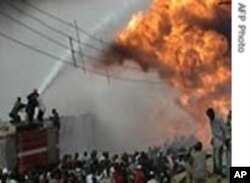The Nigerian government says it has introduced a campaign to educate the public on how to cope with natural and man-made disasters.
It’s not unusual for parts of the Niger Delta to be struck by flooding, drought and even the sabotage of oil pipelines.
Helping to manage these crises is the National Emergency Management Agency, which has offices throughout the country.
Umesi Emenike, the coordinator of the agency for the Niger Delta, said “we are using disaster risk reduction strategies, such as advocacy, and [making sure state] governments establish a legal framework to set up agencies that will manage disasters.’’
His own agency has also begun a nationwide network of risk reduction clubs in schools to teach children and teenagers how to prevent emergencies, and how to cope with them should they occur.
He said children can be taught how to prevent disasters at home: “If you are home,” he said, “switch off the lights when you leave, do not keep sharp objects around where there are people, do not play with fire, be sure you do not drop refuse or filth around your environment. These are simply things…to let children know they can do what’s good for them at home.”
He warns people to stay at home during heavy rains and to call authorities if water levels rise. “Do not try to walk through flash floods,” he said. “Even water six inches high can push down an adult. Water moving at a fast rate at one or two feet high can push over a moving bus. People should always avoid areas where there is heavy rain because there could be a flash flood. Stay at home, call for help, and don’t try to be a hero.”
The public education campaign also teaches the public not to try to collect oil from leaking pipelines because of the risk of fire and offers practical advice for preventing local problems like gully erosion.
“To fight it we have to be sure our towns are planned properly so they can respond to running water [with appropriate drains]. Where there is gully erosion we should return to local vegetation. We advise people to plant bamboo trees to reduce the speed of the water. When the vegetation comes back, gully erosion will begin [receding].”
Emenike said disasters can affect anyone, and community members must work together to minimize the threat they pose.





